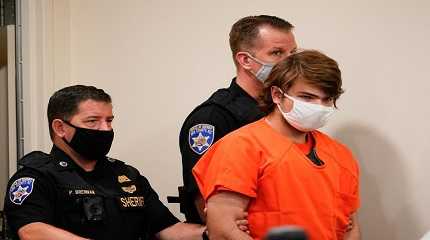
BUFFALO, N.Y. (AP) — A white gunman who targeted a Buffalo supermarket in a predominantly Black neighborhood plans to plead guilty on Monday to killing 10 people and wounding three others, according to lawyers representing victims’ relatives.
Payton Gendron, 19, is scheduled to appear in Erie County Court for a hearing that was postponed for a week by a snowstorm.
Gendron’s lawyers disclosed in recent weeks that he planned to plead guilty to all of the counts in a state indictment and to waive his right to appeal, according to attorneys John Elmore and Terrence Connors, who represent families of those killed and injured.
Erie County District Attorney John Flynn declined to comment on the nature of Monday’s court appearance, citing a court-imposed gag order.
The 25-count grand jury indictment includes charges of murder, murder as a hate crime and domestic terrorism motivated by hate, which carries an automatic life sentence upon conviction.
Gendron also faces charges for separate federal hate crimes that could result in a death sentence if he is convicted. The U.S. Justice Department has not said whether it would seek capital punishment.
Investigators said Gendron drove about three hours to Buffalo from his home in Conklin, New York, intending to kill as many Black people as possible at a store that he chose because of its location in a predominantly Black neighborhood.
Shortly before opening fire with an AR-15-style rifle on May 14, he posted documents that outlined his white supremacist views and revealed that he had been planning the attack for months. Inside the store, he roamed the aisles and livestreamed the attack from a helmet-mounted camera as he shot store employees and shoppers.
Those killed ranged in age from 32 to 86.
He was arrested in the parking lot upon exiting through the store’s front entrance.
Relatives of the victims have since called on Congress to address issues of white supremacy and gun violence. A food summit organized by Buffalo-based attorney and activist Kevin Gaughan last month focused on closing the “grocery gap” laid bare by the attack on the neighborhood’s only supermarket.
The supermarket was closed for two months.




